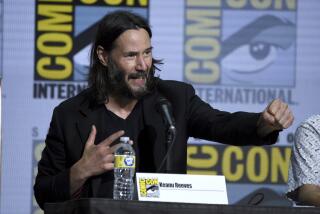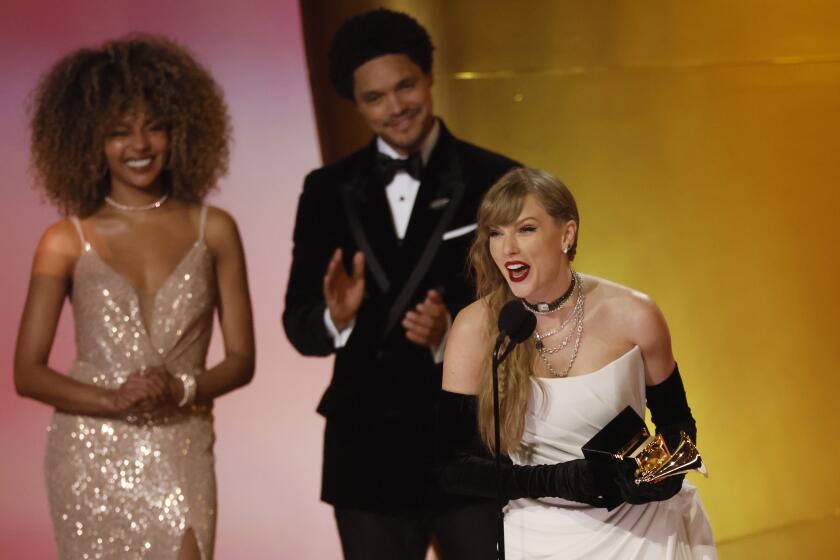They Came. They Saw, They Videotaped : WATCHING TV WITH THE RED CHINESE, <i> By Luke Whisnant (Algonquin Books of Chapel Hill: $17.95; 310 pp.)</i>
- Share via
Dexter Mitchell does odd jobs in a Cleveland community theater after finding no acting work at all in New York. When he looks in the mirror, he sees the cool half-smile of his generation and a face “white as milk, white as new snow, pasty and white as sliced white bread.”
“I can’t feel anything except this veil of irony,” he says. “You are a very ironic man,” says Tzu, one of three mainland Chinese who have moved in across the hall. They are not ironic but inflamed, these three. It is 1980; Ronald Reagan has replaced Jimmy Carter. The United States has voted against malaise but suffers from it, and the Chinese students burn with curiosity and the effort to decode the myriad signs that bombard American lives.
“Flea-flicker,” shouts Little, the African-American high school teacher who lives downstairs and is out in the yard calling football signals to his sons. Wa stands bemusedly in the supermarket contemplating a wall of red-and-white Campbell Soup cans. The three come to Mitchell to ask him the difference among Tide, Cheer and Biz, and in what syntactical sense each of these names is used. He shows them how to measure a cupful in their Daffy Duck glass.
“Everywhere there is meaning, order, shared knowledge--if you know the code,” he reflects. The message in this witty and very sad book is that perhaps there isn’t.
“Watching TV With the Red Chinese” is about the comic and eventually disastrous entanglement of the students in the American code, and the sobering transformation of Mitchell, the narrator, who witnesses the entanglement. The theme of foreigners encountering the United States is not new, neither is the use of their missteps as a way of suggesting our own. But Whisnant’s first novel is a fresh and ingeniously constructed variation.
It begins lightly enough with two simultaneous kinds of telling. Mitchell recalls his exploratory camaraderie with Tzu, Wa and Chen; a spirited game, with puzzlement and delight on both sides. At the same time, we read a description of shots from a video film. A ludicrously self-important film student has decided to take as his project the trio’s adventures in American culture. One or another is shown at a Thanksgiving dinner, at a store, or waving from a car. Mostly, they are shown watching television and commenting.
Chen, the youngest, shops elatedly and tries his best to swallow America whole. Watching sports on TV, he marvels: “So many people watching the Monday Night Football. Seeing the same play and hearing the same words . . . . And I think what this is like, to have the whole country watching, to have everyone together, a system, a series, parts that relate to be a whole thing.”
Wa, more orthodox, is distrustful. He is filmed watching someone watching TV and switching from channel to channel. Americans lack purpose and continuity, he complains. “They move from moment to moment like butterflies among flowers.”
Tzu, the most reflective, comes up with a subtitle after an afternoon’s swirl of commercials for aspirin, deodorant, cars, blue jeans, bacon, toilet paper: “The Ten Thousand Things that have no substance.” All three are charmed by Americans’ warmth, and amused by their cloudy knowledge of the rest of the world including China. Old Charlie Chan re-runs convulse them. For days, they bark “Chop chop” at each other, and make up mock aphorisms: “Man of thousand face not shave so good.”
From the start, though, there are shadows. Even in the early, sprightly narrative there is a mention of Chen’s dead face. As for the TV film, it will remain at the end as the saddest of images, like a child’s skipping-rope that has broken the child’s neck.
Beneath America’s blithe signs and codes, real things happen. Love, for example. Mitchell is infatuated with Suzanne, an ex-hippie whose head is filled with the air of the times. From Czap, her punk-surrealist-philosopher lover, she has learned a convenient version of Leibniz’s Theory of Possible Worlds. To sum up Czap: Anything is true if you rearrange the “if.” Hitler has a Jewish wife if he is married to a Rachel Cohen. Give the phrase that precedes if the same value as the phrase that follows it, and reality is whatever you want to make it.
This empty tautology allows Suzanne to do what feels good. It allows her to sleep a couple of times with Mitchell and then stop, assuring him that in a different Possible World they could be serious lovers. It allows her to seduce the innocent Chen.
Mitchell is painfully jealous, though he mostly tries to be nice about it. Tzu and Wa, who feel responsible for their younger friend, are horrified. Wa glowers; Tzu is more indirect. In a talk about God, Mitchell lightly asks if religion isn’t the opium of the people. Tzu replies: “Actually, there are many opiates. Could it be that the Theory of Possible Worlds is one?”
It poisons Chen. The generation’s casual love-making is one American reality that underlies the commercials. Another is violence. Two young black men mug Chen. He is not badly hurt but he is badly shaken, the more so when the doctor in the emergency ward shows him his gun and advises him to buy one.
And then Czap, whose Possible Worlds allow him to do whatever feels good, and whose nature makes sadism feel good, issues brutal, jealous threats over the phone. Already disoriented by Suzanne’s flakiness and the mugging, Chen breaks down. He and Wa--who tends to think in military terms--buy a gun for defense. Panic-stricken when Czap appears, and thinking he will be killed, Chen rushes at his tormentor. The gun goes off in what, in fact, is a freak as well as a lethal accident.
At the investigation, the district attorney’s “accident” decision strikes everyone as OK; what happened was awful but not really anyone’s fault. That is not good enough for Chen’s countrymen. They come up afterward to Mitchell, their guide to a world that now seems evil as well as inexplicable. “In the dark parking lot, with Tzu clutching his arm, Wa cursed me bitterly in vile Chinese, face contorted behind his tear-fogged glasses.”
Few societies, Mitchell reflects at the end, indulge our kinds of accidents. People are responsible for what happens and there is only one possible world for it to happen in.
It is a moral, but it feels more like a discovery, one that grows quite naturally out of this beautifully balanced book. It has a touch of self-consciousness, but we already know Mitchell as a self-conscious inquirer. He is an appealing one as well. He and his creator have struck a spark out of the clash of cultures; what we see by it is sobering.
More to Read
The biggest entertainment stories
Get our big stories about Hollywood, film, television, music, arts, culture and more right in your inbox as soon as they publish.
You may occasionally receive promotional content from the Los Angeles Times.










